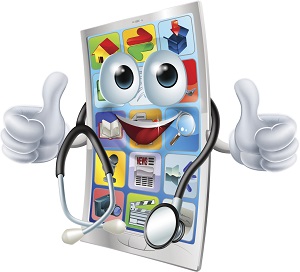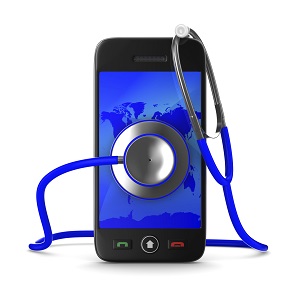 Too many apps on your smartphone? There’s an app for that.
Too many apps on your smartphone? There’s an app for that.
And why not? There seems to be an app for everything these days, but according to PC Magazine, right now only seven of the top 100 have anything to do with health.
That’s going to change dramatically in the next couple of years, and savvy healthcare providers might want to think about how to use the coming revolution to their advantage.
Outdoing Dr. Google
One of the first ones to enjoy adoption by the medical community seems to take a cue from Dr. Google, whose success arose largely from the democratization of medical knowledge.
After all, in the original Hippocratic Oath doctors promised to teach their pupils and “none else,” establishing the premise that “doctor knows best” long before we even knew what caused disease. Dr. Google blew a hole through that secrecy, and the app revolution promises to eliminate it altogether.
For example, at the ICU department in the Johns Hopkins Medicine hospital in Baltimore and at the University of California in San Francisco, they’re testing an app that cuts through virtually every aspect of secrecy. It’s designed to bring patients and families into the decision-making process because, evidence suggests, that’s safer and more effective.
More significantly for the future of medicine, the app also operates from the premise that doing “harm” – traditionally, if not explicitly, forbidden by the Oath – includes disrespectful treatment.
In an ICU where over the course of a day a patient might witness twenty or more clinicians doing incomprehensible things related to their care, confusion counts as disrespect, so the app makes it easy for the patient or her advocates to know who they are and what they’re up to. The app also shows the plan of care and includes information about their condition and medications. It even shows them their lab results, long the sole domain of the doctor.
Collecting samples for lab analysis may soon become a do-it-yourself endeavor as well. Touch a new smartphone-connected tool to your forehead and it can send a slew of vital signs to the lab for analysis. That one already has FDA approval as an investigational device; right on its heels is another one from the same company that will take a urine sample and sync up with the lab through your phone.
Hand-held ultrasound devices already exist, even replacing stethoscopes at some medical schools, as do hand-held MRI and X-ray machines, which may take the concept of a “selfie” to an entirely new level. Given that one in twenty-five people who goes to a hospital contracts an infection just because they’re there, it may be reasonable to expect demand for these services to be strong and influential.
In fact, virtual doctor’s appointments have already entered the mainstream; in 2014 as many as one in six consultations took place virtually. Or the doctor may go to the patient; in some major cities phone apps let people arrange house calls, often for about the same price as a co-pay.
Obesity and Depression May Not Survive the Smartphone
 And then there’s prevention, which the modern Hippocratic Oath says “is preferable to cure.” From the ancient one we can lift the essential component of today’s approach: “I will devise and order for [my patient] the best diet.”
And then there’s prevention, which the modern Hippocratic Oath says “is preferable to cure.” From the ancient one we can lift the essential component of today’s approach: “I will devise and order for [my patient] the best diet.”
While the health food trend spirals upward, forcing McDonalds to rethink its business plan, Americans still have a hard time knowing what’s actually good for them. While it may seem logical to think that replacing your soda with cranberry juice or sport drinks will lower your sugar consumption, the reality is completely illogical.
Following in John Hopkins’s anti-secrecy footsteps, a plethora of apps now let you scan the barcode on practically anything and completely undo any misleading advertising that may have prompted you to pick it up in the first place.
Other apps serve as virtual physical trainers or yoga teachers, many of them also serving as gateways to communities of like-minded people.
Which brings us to perhaps the most innovative and unexpected sort of healthcare app: the virtual psychotherapist. By tracking all sorts of behaviors, from how many texts you send to the tone of your voice, developers explore how your cell-phone behaviors correlate to your psychological well-being. Trials are already in place; the next generation of these apps may well turn your phone into your virtual mother.
Billing Codes May Soon Clarify Rather Than Conceal
Analysts expect two types of demand to drive the development of these technologies: first, since consumers have already become accustomed to Dr. Google and to involving their phone in practically everything they do, they may feel that absorbing healthcare into that sphere is obvious and beneficial.
And second, it’s possible that these apps could enable doctors to work more efficiently by offloading some of the physical work into people’s homes and the digital realm, reducing health care costs.
From a health clinic owner or manager’s point of view, that last may be the most significant. In the same way the mysterious workings of clinicians or the meaning of lab reports is now being brought to light by these apps, so might healthcare billing.
While invoices are commonly provided today, they are usually incomprehensible to a layperson. That same invoice in a phone app will become crystal clear, ready to be compared to experience, verified by involved family members – and questioned on a national scale.
Those are pretty powerful forces, so embracing this trend now may be your safest – and ultimately your most lucrative – course of action.
“Prescribing” some of the commonly available diet, exercise and even “brain training” apps might pay big dividends as these other technologies expand and become more sophisticated. Getting patients used to a “prescription” like that today might enable you to provide more efficient care, with fewer obstacles, tomorrow.
It may be that healthcare providers who do something along these lines will be considered the most progressive – and thus the most trustworthy. You might add to that perception by offering payment plans that are not financing, that don’t require a credit check, but that let your patient pay less than full price up front. We can help you there – click here for a rundown on MED-RDC, or click on the image below to find out how.
But more importantly, there’s one more phenomenon on the horizon you really should consider. In fact, you might want to establish an entire network of living, breathing doctors to confront what will almost certainly become a national epidemic sometime soon.
The threat is called nomophobia. Which is, of course, the mortal terror of being without your phone.



